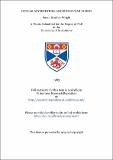Ocular asymmetries and binocular vision
Abstract
This study was undertaken to investigate ocular asymmetries in binocular vision using several dichoptic and binocular viewing paradigms. The literature on eye dominance was reviewed and it revealed that little emphasis both theoretically and experimentally had been placed on binocular viewing situations. The nature of the eye dominance tests and the dichotomous classification of the results suggested that one eye's image was competing against the other. The relationship between the different eye-dominance tests was not clear. A new approach to the study of ocular dominance has been developed in this thesis with specific attention to binocular vision and viewing situations. The term eye dominance has been replaced by the term ocular asymmetries to describe the results and measures derived from these procedures and the nature of the binocular visual approach. The experimental work is divided into three sections. Section one, is concerned with a binocular rivalry procedure using real images and afterimages. Section two, involves a stereoscopic viewing procedure and depth discrimination task with selective attenuation of the stereo-displays. Section three, investigates the interocular transfer of the spatial frequency shift. Measures of ocular asymmetry were derived, from all three procedures and the three sets of scores were positively related. This measure gives both the direction and the degree of the ocular asymmetry. The results indicate that ocular asymmetries are a valid feature of binocular vision. The new measure derived from the depth discrimination experiment provides a quantitative and consistent measure of ocular asymmetry. Special attention has been directed at the involvement of eye movements in all three paradigms and as the underlying factor in the asymmetry results. On the basis of the findings it was suggested that the asymmetry may reside in the binocular system controlling eye movements or reflect an asymmetry in processing speeds of the images from the two eyes arriving at the binocular site. The ocular asymmetry measures do not necessarily indicate eye movements are asymmetrical. It is recommended that ocular asymmetry is a variable to be studied in other investigations of binocular vision and binocular interactions.
Type
Thesis, PhD Doctor of Philosophy
Collections
Items in the St Andrews Research Repository are protected by copyright, with all rights reserved, unless otherwise indicated.

